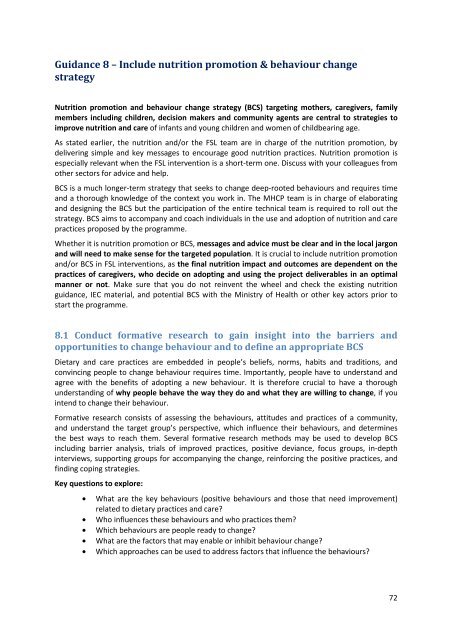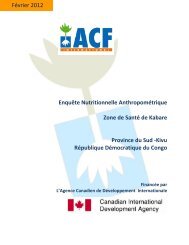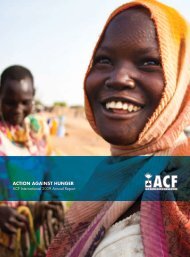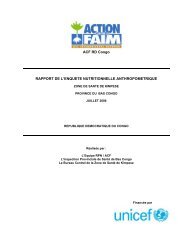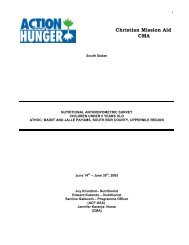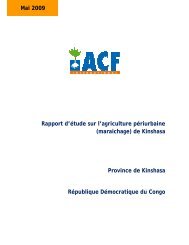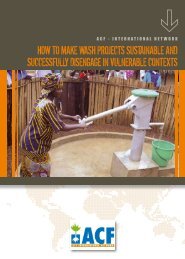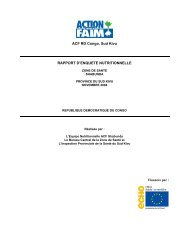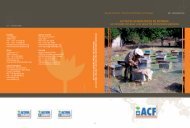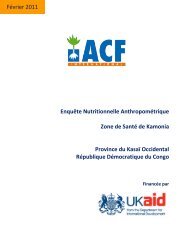Maximising the Nutritional Impact of FSL Interventions FINAL
Maximising the Nutritional Impact of FSL Interventions FINAL
Maximising the Nutritional Impact of FSL Interventions FINAL
Create successful ePaper yourself
Turn your PDF publications into a flip-book with our unique Google optimized e-Paper software.
Guidance 8 – Include nutrition promotion & behaviour change<br />
strategy<br />
Nutrition promotion and behaviour change strategy (BCS) targeting mo<strong>the</strong>rs, caregivers, family<br />
members including children, decision makers and community agents are central to strategies to<br />
improve nutrition and care <strong>of</strong> infants and young children and women <strong>of</strong> childbearing age.<br />
As stated earlier, <strong>the</strong> nutrition and/or <strong>the</strong> <strong>FSL</strong> team are in charge <strong>of</strong> <strong>the</strong> nutrition promotion, by<br />
delivering simple and key messages to encourage good nutrition practices. Nutrition promotion is<br />
especially relevant when <strong>the</strong> <strong>FSL</strong> intervention is a short-term one. Discuss with your colleagues from<br />
o<strong>the</strong>r sectors for advice and help.<br />
BCS is a much longer-term strategy that seeks to change deep-rooted behaviours and requires time<br />
and a thorough knowledge <strong>of</strong> <strong>the</strong> context you work in. The MHCP team is in charge <strong>of</strong> elaborating<br />
and designing <strong>the</strong> BCS but <strong>the</strong> participation <strong>of</strong> <strong>the</strong> entire technical team is required to roll out <strong>the</strong><br />
strategy. BCS aims to accompany and coach individuals in <strong>the</strong> use and adoption <strong>of</strong> nutrition and care<br />
practices proposed by <strong>the</strong> programme.<br />
Whe<strong>the</strong>r it is nutrition promotion or BCS, messages and advice must be clear and in <strong>the</strong> local jargon<br />
and will need to make sense for <strong>the</strong> targeted population. It is crucial to include nutrition promotion<br />
and/or BCS in <strong>FSL</strong> interventions, as <strong>the</strong> final nutrition impact and outcomes are dependent on <strong>the</strong><br />
practices <strong>of</strong> caregivers, who decide on adopting and using <strong>the</strong> project deliverables in an optimal<br />
manner or not. Make sure that you do not reinvent <strong>the</strong> wheel and check <strong>the</strong> existing nutrition<br />
guidance, IEC material, and potential BCS with <strong>the</strong> Ministry <strong>of</strong> Health or o<strong>the</strong>r key actors prior to<br />
start <strong>the</strong> programme.<br />
8.1 Conduct formative research to gain insight into <strong>the</strong> barriers and<br />
opportunities to change behaviour and to define an appropriate BCS<br />
Dietary and care practices are embedded in people’s beliefs, norms, habits and traditions, and<br />
convincing people to change behaviour requires time. Importantly, people have to understand and<br />
agree with <strong>the</strong> benefits <strong>of</strong> adopting a new behaviour. It is <strong>the</strong>refore crucial to have a thorough<br />
understanding <strong>of</strong> why people behave <strong>the</strong> way <strong>the</strong>y do and what <strong>the</strong>y are willing to change, if you<br />
intend to change <strong>the</strong>ir behaviour.<br />
Formative research consists <strong>of</strong> assessing <strong>the</strong> behaviours, attitudes and practices <strong>of</strong> a community,<br />
and understand <strong>the</strong> target group’s perspective, which influence <strong>the</strong>ir behaviours, and determines<br />
<strong>the</strong> best ways to reach <strong>the</strong>m. Several formative research methods may be used to develop BCS<br />
including barrier analysis, trials <strong>of</strong> improved practices, positive deviance, focus groups, in-depth<br />
interviews, supporting groups for accompanying <strong>the</strong> change, reinforcing <strong>the</strong> positive practices, and<br />
finding coping strategies.<br />
Key questions to explore:<br />
• What are <strong>the</strong> key behaviours (positive behaviours and those that need improvement)<br />
related to dietary practices and care?<br />
• Who influences <strong>the</strong>se behaviours and who practices <strong>the</strong>m?<br />
• Which behaviours are people ready to change?<br />
• What are <strong>the</strong> factors that may enable or inhibit behaviour change?<br />
• Which approaches can be used to address factors that influence <strong>the</strong> behaviours?<br />
72


